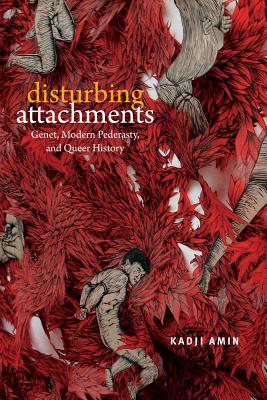 Disturbing Attachments: Genet, Modern Pederasty, and Queer History
Disturbing Attachments: Genet, Modern Pederasty, and Queer History
by Kadji Amin
Duke U. Press. 272 pages, $25.95
QUEER THEORY was born in the early 1990s as an academic approach to critiquing “heteronormative”—read “anti-gay”— ways of life. Drawing on the work of Michel Foucault, the field’s pioneering scholars, including Judith Butler, Eve Sedgwick, and David Halperin, examined how technologies of power manufactured and maintained identities like male and female, gay and straight. Queer theory took its central project to be the destabilization of categories like sex, gender, and sexuality as constructed by a given society.
But LGBT people themselves haven’t always cooperated in destabilizing social norms. Instead, many have aligned themselves with normative institutions such as marriage and conventional sex roles; transphobia persists in gay and lesbian communities; and racial minorities often experience discrimination. Kadji Amin’s new book, Disturbing Attachments: Genet, Modern Pederasty, and Queer History, investigates a few of the issues at the heart of contemporary queer theory. By examining the discomfiting practices and politics of the controversial French author, Jean Genet, Amin finds that queer theory has often disregarded its commitment to challenging repressive social norms.
Disturbing Attachments, which arose out of Amin’s doctoral dissertation, demonstrates an impressive grasp of Genet’s œuvre. From Genet’s biographer Edmund White, we learn of Genet’s illegitimate birth in Paris in 1910, his foster childhood in the French countryside, his reform education at the Mettray Penal Colony, and his eventual desertion from the army to become a prostitute, a vagabond, and a thief. At 32, Genet left prison after a stay, having completed his first novel, Our Lady of the Flowers, and over the next six years he wrote four more critically admired novels. Following a period of writing plays, in the 1970s and ’80s Genet turned to political activism, championing the Black Panthers movement and the struggle for a Palestinian homeland.
Amin seeks to understand how queer theory tries and fails to account for Genet’s radicalism. For Amin, “Genet embodies the queer romance of the alternative,” a paragon of defiant, radical nonconformity from the pre-Stonewall past. Queer studies celebrates Genet as a criminal and a social outlaw. Sartre held him up as a “saint,” a paragon of white antiracism and activism. For queer theorists, Genet is the antihero who is emblematic of their investment in social marginality and radical deviance.
This idealization, however, doesn’t sit well with Amin, who contends that Genet’s blind spots for racial, cultural, and geographic difference points to precisely those areas that queer theory ignores—what Amin calls “disturbing attachments.” This conclusion runs counter to what Amin expected to find when he set out to show how Genet’s life and work offered possibilities for the creation of queer community and political action centered not on identity but on nonconformity. But he couldn’t shake the unsettling parts of Genet’s life story that didn’t fit into this utopian narrative, namely, how significantly his work and activism reflected his own racial fetishism and his investment in pæderastic kinship rooted in hierarchical and colonial practices between sexual partners.
Rather than pin these failures on Genet alone, Disturbing Attachments shows how Genet’s troubling racist and non-egalitarian attitudes are matters that queer theory hasn’t fully dealt with. If the central tenet of queer theory is resistance to the normalization of power and the destabilization of categories like sex, gender, and identity, then Genet shows us how queer theory has more work to do.
On the problem of race, Genet’s 1949 novel The Thief’s Journal describes a scene in which the white narrator Jean fantasizes about being overpowered and penetrated by a black top. Jean’s aim, writes Genet, is to be released altogether from the bonds of the present time, to annihilate himself in the act of submission. While this seems a radical view, Amin attempts to show how such a fetishization of black or Arab sexual penetrators is rooted in colonial attitudes that view people of color as sexual “brutes,” a vestige of which persists today among white gay men. Amin suggests that we cannot understand Genet’s politics as distinct from an æsthetic that reproduces a colonial encounter during sex.
Amin’s commitment to re-evaluating the unsettling practices of Genet’s life represents a serious attempt to contend with the colonial, racist, and hierarchical legacies present in queer social forms. The radical power of queerness, from its original theoretical goal, is to destabilize the categories and norms that we take for granted. Amin’s study is deeply invested in this aim, asking queer theory to question its own attachment to gay liberalism and other acceptable ideologies. At heart, his interest in modern pæderasty is indeed thought-provoking: How did this ancient institution morph from cutting-edge to unspeakable within the span of a century? It raises the larger, inherently political question: what is queer theory, so closely attached to liberalism, willing to examine, and what is strictly off limits?
Amin’s language is full of dense and swirly academic jargon, which will make this study inaccessible to some readers. Others may be dissuaded by the fact that, with the discussion of such troubling moral issues as queer pæderasty and radical terrorism, Amin doesn’t come out on one side or the other. Rather, he reminds readers how contingent identity is as a mode of developing political organization or community. Disturbing Attachments, by investigating the traction queer theory can have in contending with the compromises and failures hidden within its own field, demonstrates the potential for critical self-inquiry.
Rajat D. Singh is an essayist living in New York.





